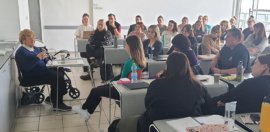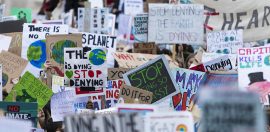NFPs Concerned Over Democracy
20 May 2016 at 11:45 am
More than 30 Not for Profits, community leaders, unions and commentators in civil society have united to speak out about the media treatment of Duncan Storrar and what this says about the current state of Australian democracy.
The group have issued a national Civil Society Statement of Concern, expressing concerns about the “intrusive negative scrutiny” Storrar has faced in recent weeks, which they argue sets a dangerous precedent across the democratic process.
Storrar, who was identified as a person with disability experiencing a low income, came to prominence after appearing on ABC’s Q&A on Monday 9 May to ask a question about the budget and tax inequality.
The group claims that since asking that question Storrar has been subjected to an onslaught of “personal investigations, attacks, intrusion into his privacy, family and ridicule in a range of publications, including The Australian and The Herald Sun newspapers”.
“The patent disregard of the impact of this reporting on an individual is an abuse of power. The reporting has also been a further example of the willingness of parts of the media to vilify and demonise people on low incomes or from marginalised backgrounds,” the statement said.
“The issues involved go beyond one individual and represent a turning point for the open debate, discussion, criticism and dissent which underpin our free society.
“It is a public right to ask questions. It is the job of the media to report them and the responsibility of parliamentarians to protect our ability to do so.”
Craig Wallace, People with Disability Australia (PWDA) president, who is spearheading the campaign, said the group had been watching with increasing alarm over the last two weeks “the unprecedented vilification of a man with a disability, experiencing a low income, simply for having his say on a current affairs program”.
“This man is not a politician, as far as we know, he is not a lobbyist, he is not a professional person, he is simply like the many thousands of Australians that we represent, and he is now being bullied and vilified for taking part in the political process,” Wallace told Pro Bono Australia News.
“My organisation initiated this, we held concerns this was not just an issue about disability, it was an issue about democracy and the health of civil society more broadly, so together with our partners at ACOSS as well as the other members of the Australia Cross Disability Alliance, we started talking over recent days to a large number of organisation including human right lawyers, trade unions, we’ve got St Vincent de Paul, we’ve got Tom Calma who is the chancellor of the ANU, all of them with a common concern that democracy is being undermined.
“This is an unprecedented response to an unprecedented event. Never in my career in the media, the bureaucracy or in public life have I seen a voter excoriated during an election campaign, simply for asking a question on a valid current affairs issues within a program that was meant for that purpose.”
The group have also raised concerns there is a lack of leadership from politicians over the issue.
“It’s also time we heard where our leaders stand on the rights of all people, particularly community members, to participate in public debates without bullying and intimidation,” the statement said.
“Political leaders have a positive obligation to protect public participation by people who are less powerful, knowing that more powerful people will otherwise dominate our democracy.”
Wallace said the politicians should have been the first ones to speak out.
“I think that Duncan has touched a raw nerve in terms of income inequality, in terms of some of the discussions that are going on at the moment around the need for more equity in our system. I also think unfortunately there has been a creeping pattern of vilifying vulnerable individuals who are at the centre of disadvantage. We’ve seen that with some of the headlines around people on DSP being described as bludgers and rorters, what is concerning about this to us though is that there has been a kind of vacuous silence, where the politicians haven’t come out and actually said ‘well hang on, this is one of our voters. He’s being an informed voter, it’s his right to do this, he’s meant to questions’.
“I would have expected that the first people to have jumped up and said ‘hey hang on guys this is a bit rough’ would have been the politicians. But they haven’t touched this because like many Australians this is a guy who has had a hard life, a complex life with tangled threads and broken strands, he’s like many Australians outside of the Melbourne, Sydney, Canberra cafe belt, he’s got complex families, I grew up in an area like that, I exactly know what it’s like,but it doesn’t mean that you can’t hold sway of the Australian population out of our democracy.
“That is why all of the undersigned organisations feel so strongly about this. We feel that democracy is being undermined and I never thought that I would be saying that in Australia.”
The group is calling on the national leaders to reaffirm the rights of all people regardless of background, disability or income level, to take part in public debate free from bullying, personal intrusion, harassment or intimidation.
“I want both leaders, Malcolm Turnbull and Bill Shorten, to put aside their differences and both strongly and publicly reaffirm the right of all Australian voters, including marginalised people, to ask questions and take part in the public domain free from bullying and intimidation,” said Wallace.
“I want the new human right commissioner… to look at whether we need an Australian Bill of Rights in order to protect individuals like Duncan and civil society organisations from bullying and vilification in the future.
“Lastly I think the media needs to take actually a bit of an introspective look after this and realise that their right to report free from government interference is actually entwined with the free people and the rights of people like Duncan to speak out.”
Work on the Civil Society Statement was initiated by PWDA and has received strong backing from a broad cross section of community leaders as well as other members of the Australian Cross Disability Alliance.
Wallace said the support had been fantastic.
“This continues to grow, it’s a huge list,” he said.
This Civil Society Statement of Concern is supported by:
- Robert Altamore, Executive Officer, People with Disability ACT (PWD ACT)
- Karen Batt, Community and Public Sector Union Joint National Secretary
- Greg Barns, Barrister and Former National President of the Australian Lawyers Alliance
- Jackie Brady, Executive Director, Family Relationships Services Australia
- Julian Burnside, AO QC
- Irina Cattalini, Chief Executive Officer, WA Council of Social Service (WACOSS)
- Kasy Chambers, Executive Director, Anglicare Australia
- Dwayne Cranfield, Chief Executive Officer, National Ethnic Disability Alliance (NEDA)
- Dr John Falzon, Chief Executive Officer, St Vincent de Paul Society, National Council of Australia Carolyn Frohmader, Executive Director, Women With Disabilities Australia (WWDA)
- Travis Gilbert, Executive Officer, ACT Shelter Inc
- Dr Cassandra Goldie, Chief Executive Officer, Australian Council of Social Service (ACOSS)
- Kym Goodes, Chief Executive Officer, Tasmanian Council of Social Service (TasCOSS)
- Damian Griffis, Chief Executive Officer, First Peoples Disability Network (Australia)
- Meredith Hammat, Secretary, UnionsWA
- Max Hardy, Consultant, author and advocate for citizen voice
- Susan Helyar, Director, ACT Council of Social Service Inc. (ACTCOSS)
- Mark Henley, Chief Executive Officer, Queensland Council of Social Service (QCOSS)
- Ged Kearney, President, Australian Council of Trade Unions (ACTU)
- Tim Kennedy, National Secretary, National Union of Workers.
- Emma King, Chief Executive Officer, Victorian Council of Social Service (VCOSS)
- Dr Caroline Lambert, Executive Officer, YWCA
- Marcelle Mogg, Chief Executive Officer, Catholic Social Services Australia
- Wendy Morton, Chief Executive Officer, NT Council of Social Service (NTCOSS)
- Michele O’Neil, National Secretary, National Secretary of the Textile Clothing and Footwear Union of Australia
- Adrian Pisarski, Executive Officer National Shelter
- Christina Ryan, Chief Executive Officer, Advocacy for Inclusion
- Jo-anne Schofield, National Secretary, United Voice
- Gerard Thomas, Welfare Rights Centre NSW
- David Thompson, Chief Executive Officer, Jobs Australia
- Craig Wallace, President, People with Disability Australia (PWDA)
- Alex White, Secretary, UnionsACT
- Greg Withers, Chief Executive Officer, Community Housing Industry Association
- Ross Womersley, Chief Executive Officer, SA Council of Social Service (SACOSS)
- Heather Yeatman, Board President Public Health Association Australia








Nasty, abusive online attacks against anyone voicing an opinion have become so common that people are beginning to think it is acceptable to lack any sort of compassion or concern for the feelings of others.
While he may be a hard luck case, this man was hardly a shining example which the Q&A audience would not have known at the time. This is really just another version of the tall poppy syndrome. Hopefully this group of Civil Society figures will support his fund raising activities as well as come to the defence of other figures, particularly on the ‘right’ who are attacked many times worse than what Duncan went through.